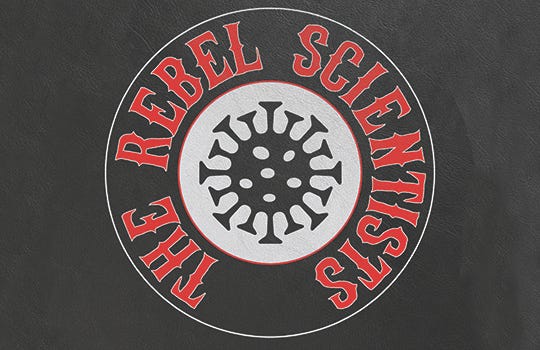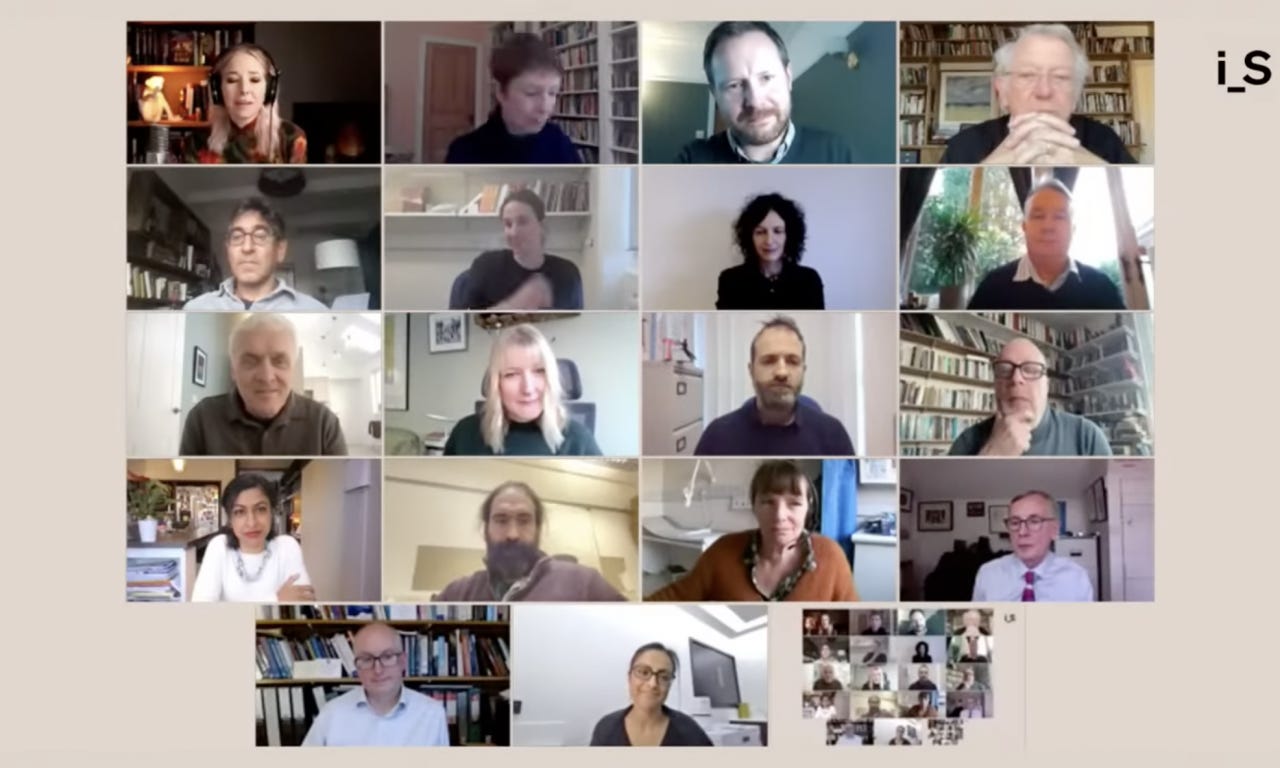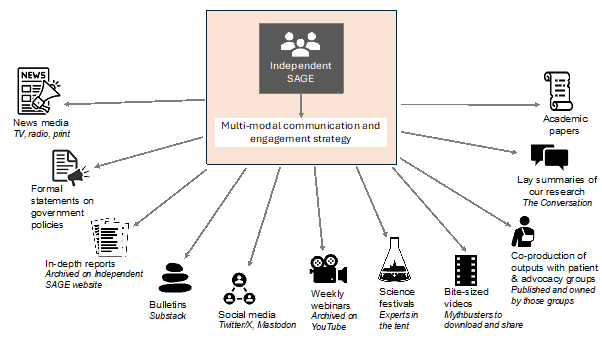What did we learn from our experiences with Independent SAGE?
We recently published an article in Nature Protocols about our experiences communicating science. This article summarises the part of the article relating to the learning points from our development.
This is the second of a two-part series based on our recent paper in Nature Protocols - “Independent SAGE as an example of effective public dialogue on scientific research”. In the first part “The inside track on Independent SAGE” we summarised the part of the paper relating to the activities and organisation of the group. In this second part we’ll summarise the parts of the article that focus on the learning that came out of the Independent SAGE experience.
Learning points from Independent SAGE’s Development
As a voluntary unofficial group, Independent SAGE had a collegiate culture and little internal hierarchy. Whilst this ethos of informal, non-bureaucratic scientific dialogue remained as the group grew and matured over time, several learning points emerged across scientific, ethical, practical and operational domains. These points should not be seen as a universal formula or blueprint for an emerging health emergency, but perhaps as guiding principles.
Clarity and transparency
Clear and concise messages, supported by visual representations of data, are key. Public trust in science and science-based policy is diminished by secrecy, whereas it increases when both facts and uncertainties are openly shared with the public. It is important to convey the estimated level of uncertainty around a scientific question or issue and, where appropriate, to change position in the light of new evidence.
Independent SAGE was also transparent about its collective values: we advocated for evidence-based policy that protected lives, reduced pressure on health services and took into account social influences on and consequences of health decisions.
Engaging with the science-policy interface
The maxim “scientists advise, ministers decide” overlooks how, in reality, policymaking (and especially crisis policymaking) requires a dialogue between scientists and policymakers. Scientists must not only convey research findings, but also explain why they matter, what is at stake, how a situation is likely to unfold with, or without, implementing a particular policy and how to implement scientific insights in ways that will be effective in achieving the desired ends.
We sought to present scientific data not in a value-free bubble but as inextricably tied to the values which informed particular policy options.
Interdisciplinarity
In a fast-unfolding public health crisis, scientists and other scholars from a range of backgrounds and disciplines need to work together and understand each other. Independent SAGE members covered a deliberately wide range of expertise, and because of interdisciplinary insights, our collective outputs were more than the sum of our parts. As the group worked together, each member developed a clearer understanding of how their own scientific contribution complemented that of other members, allowing us to draw flexibly on each other’s expertise. If a particular discipline was needed for a topic but not present within the group, we invited an external expert.
Addressing inequality
The COVID-19 pandemic exacerbated existing inequalities throughout society. It disproportionately affected various marginalized and vulnerable groups. Similarly, the COVID response affected these groups in different ways, and policymakers’ failure to acknowledge this and mitigate against it only exacerbated those inequalities.
From the earliest days of the pandemic, we were concerned that the pandemic’s impact would fall disproportionately on more vulnerable groups. We repeatedly raised the pervasive issue of inequalities in written academic reports. We wrote many articles for the general press on the importance of welfare support. We raised concerns both in our independent reports and in academic journals about vaccine inequity. We covered the pandemic’s impact on children and young people and called for more action—including vaccination and attention to indoor air quality—to protect them.
Interaction and dialogue with the public
Independent SAGE’s commitment to respecting and involving the public contrasted with a government response which (some argue) saw the public as a problem. This commitment to an open dialogue with the public reflects what has been termed ‘mode two science’—occurring, at least in part, outside the walls of the university. This involves reflection on the role and ethical significance of science in society.
Supporting advocacy and interest groups
‘The public’ include well-informed and committed groups with particular expertise and/or interests on a variety of issues. We found that early and respectful dialogue with such groups could hone the key questions that needed answering and create effective channels for disseminating key findings. Conversely, advocacy and pressure groups found that engaging with a group of respected scientists like Independent SAGE increased their visibility and credibility. In some of these collaborations, the mode of interaction might legitimately be described as co-production of outputs with advocacy and interest groups rather than production of resources for those groups.
Multiple communication channels and modalities
Different sectors of the population get their information from a wide range of different sources and in different formats. Our members proactively engaged with diverse knowledge outlets, including social media microblogging sites, longer blogs, public-facing academic platforms such as The Conversation, bulletins, podcasts, books and mainstream broadcast and print media.
Regular and organized internal communications
The scientists in the group did not have to publicly agree on every issue on every occasion, but they did spend time deliberating collectively on the significance of emerging data and learning from each other. Our ‘backstage’ meetings also provided shared learning and support for members who experienced abuse on social - or indeed traditional – media, or via email. This experience was far more common for the women (particularly the women of colour) in the group, and those promoting the scientific evidence on issues that became politicized, such as masks and vaccines.
Resourcing and supporting the group communications
Even when scientists give their time for free, financial and human support is needed to run a website, stage live digital briefings, process questions and comments from the public, and make reports and publications accessible. We used two crowdfunder exercises to raise relatively modest sums. In each case, the crowdfunders were closed after a few days due to the rapid and generous responses. Fundraising efforts should be clear, transparent and focused as people need to know what will be done with any donations.
Combating misinformation and disinformation
Behavioural and social scientists on Independent SAGE provided evidence-based strategies for responding to false and misleading information. These included providing consistent and accurate messages, being honest if in doubt, communicating uncertainty, producing diagrams and infographics, and tailoring messages to different social and cultural groups.
Critical reflections on the Independent SAGE approach
The model of communication used by Independent SAGE had many strengths and (we believe) provided an important contribution to the science-policy ecosystem at a critical time. But it was not perfect, and in retrospect there are things we would have done differently.
The name ‘Independent SAGE’ was chosen somewhat hastily. The name led to confusion among the public and caused some offence in official circles. In hindsight, a different name might have been better.
The slogan ‘following the science’ was also somewhat ambiguous. The definite article (‘the’) implied that there was one (value-free) science that just needed to be identified and summarized. On reflection, a less definitive strap-line such as ‘examining the science’ might have been better.
We did not sufficiently clarify how wide our remit was in terms of topics. Notwithstanding the need to adjust our aims in response to a changing situation, it might have been better to have set clearer boundaries on our remit early in the pandemic, or at least been clearer when remits changed or broadened over time.
We did not formally set out to measure the impact of our work. This goal was probably not realistic given our prevailing circumstances and resources, but in the future, we believe it would be worthwhile to anticipate the need for independent research on the role of informal actors in the science-policy ecosystem.
Whilst we addressed misinformation and disinformation about COVID-19, we were perhaps, insufficiently proactive in responding to misleading information and deliberate untruths about Independent SAGE and our members. A leading UK medical journal depicted us as “rebel scientists”, implying (incorrectly) that our views were radical and heterodox. We could have done more to make our nuanced positions clearer and actively address the caricatures propagated by some of our critics.

Conclusions
The informal approach taken by Independent SAGE, applied adaptively to different contexts and situations, has much to offer in public health crises as part of a wider knowledge ecosystem of scientific and policy actors. Such informal models are designed to progress the science-policy-public dialogue in ways that complement (and, where appropriate, challenge) official structures and positions.
In situations where the stakes are high, the facts uncertain, the values in dispute, yet decisions are nevertheless urgent, it is more important than ever that scientists engage directly and democratically with the public. Their role must surely be to present the state of knowledge, ignorance and uncertainty on issues of the day, to support, inform and engage with the public, link with a wide range of advocacy and campaign groups and—where necessary—speak truth to power.
You can read our full Nature Protocols paper, of which this is a summary, here.




At a time when government leadership seemed to lack seriousness, Independent SAGE provided a confidence-building sense of connection, questioning and varied expertise. I remain grateful for your efforts.
In my opinion the name "Independent SAGE" was a very good name because that the time Boris Johnson was the Prime Minister and Boris tells as many lies as Trump.
The SAGE group that Boris had wasn't independent because it was led by a political person (whose name I've forgotten but he's the one who drive his car to a castle in a lock down in order to test his eye sight), so the SAGE that Boris was had was most definitely not to be trusted.
Some politicians might not like the fact that people shouldn't trust politicians who are famous for lying but that's what you get when politicians repeatedly tell lies. Perhaps politicians shouldn't tell lies and should get upset when people don't trust them.
So "Independent SAGE" was definitely a good name.